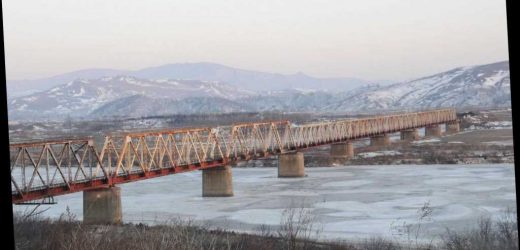A NORTH Korean border guard reportedly died after falling through ice while trying to flee across the border with his high-school lover.
The soldier from the Musan County border patrol unit vanished after he stepped onto a frozen river and fell into the icy water, according to reports.
The guard, who was in his early twenties, was dating a teenage girl who was still a high school, a source told Daily NK.
The pair decided to cross the river in Musan County, North Hamgyong Province, and flee across the border for a "better future" together.
The county borders China to the north, across the Tumen River.
The girl was first to cross the frozen river as the lovers tried to escape in December last year, the source said.
Although the ice remained intact as the girl crossed, it cracked as the guard made his way across and he was swept away.
Another border guard spotted the hole in the ice and contacted the authorities.
The girl was arrested, but the border patrol unit reportedly made no effort to search for the guard.
'OBEDIENT'
According to the source, authorities said the border guard was "usually obedient" and his colleagues claim he was only persuaded to cross the river by the girl.
The border patrol unit is "covering up for him" by saying it was not his fault or his decision to flee across the border, the source said.
Economic turmoil exacerbated by the coronavirus pandemic has reportedly led to heightened concerns in Pyongyang about attempts by North Korean citizens to flee over the border into China.
Sources said dozens of North Korean soldiers were injured when mines they were laying along the country's border with China exploded.
The mines were reportedly being placed by border guard troops to stop people defecting from North Korea into China.
North Korea is known to have used mines along its border with South Korea, but has not previously placed them on its border with China.
Mines have now been laid in at least two of the five North Korean provinces that share a border with China.
The number of yearly defectors to South Korea peaked at just under 3,000 in 2009, but has been falling consistently since Kim Jong-un took power in 2011, and is now around 1,000 per year.
Source: Read Full Article





